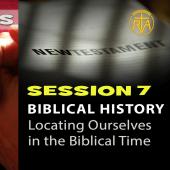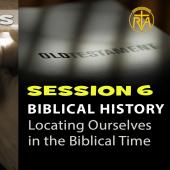WORDLINKS 4: Biblical Geography and History
This part will have 3 sections:
A. Locating ourselves in the Biblical space: geography;
B. Excursus on The Land of Jesus;
C. Locating ourselves in the Biblical time: history
To understand the biblical world, it is indispensable to acknowledge geography and history, both the Old and New Testaments. Ultimately, to understand God’s Word is about understanding God's action in a specific territory and history.
A. Locating ourselves in the Biblical space
- Geography influences the human that inhabits it, at the same time the environment is modified by the human being. The political and economic geography is not a static reality, but a dynamic one.
- The Word of God is incarnated in the geographical context that shapes it; and takes the flavor of the land where it is born. Biblical geography constitutes a first-class hermeneutical element: on it (on earth) Israel will build its own concept of “territoriality”, as a place where the biblical human being will build history, culture, religion, society, with all the economic, political and ideological systems that accompany it.
- The territory will indicate the conjunction of the world of human corporality, with the world of spirituality. Hence it is of immense value to biblical studies and hermeneutics.
- The desert: the geographical element "desert" marks the theology and spiritual mentality of the Israelites. The patriarchs, as shepherds, are familiar with the desert and from this reality they have lived God as a companion and also from this reality they knew how to craft their existencial life and ethics.
- The Israelite image of a companion, loving God is borne out of the desert context as well as their ethical norms or laws in relation to this God, in relation with self, with others, with the entire creation. It is important to understand that the theological and ethical realities, to a certain degree, are relative since they depend on the vital environment where history itself is built.
- International routes: the strategic location of Palestine made it able to participate in world events. Palestine is located on two of the most vital trade routes of the ancient world: one between Egypt and Asia, and the other westward from Arabia to the coastal plain and there to move either to Egypt or Syria.
- Israelites participation in international economic and geo-political circumstances influenced Israelite theology especially its prophetic tradition. It is therefore not surprising that the prophets dealt with this situation and saw God’s intervening action in their history.
- Many Jews left their homeland along many trade routes to make journeys and established “colonies” in major cities of the known world until the early days of the Christian movement.
- Israel's geographical position also placed it between the appetites and struggles of two great powers (Mesopotamia and Egypt). Many times they were victims of invading powers. But with all their struggles and failures, they constructed their identity and owned their history. They were made a strong people of scarcely fertile land, of taxed food, of austere wheat and barley, of grapes and oil, of figs and dates, sheep and goats.
- The “people of the land” always knew they have a God who accompanies them, faithfully.
Up next: Excursus
The Land of Jesus in Contemporary Lens
Radio Veritas Asia (RVA), a media platform of the Catholic Church, aims to share Christ. RVA started in 1969 as a continental Catholic radio station to serve Asian countries in their respective local language, thus earning the tag “the Voice of Asian Christianity.” Responding to the emerging context, RVA embraced media platforms to connect with the global Asian audience via its 21 language websites and various social media platforms.
















My prayers for this advocacy. God bless you.
- Reply
Permalink